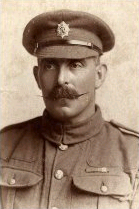One Bourne man served in two wars, the Boer War of 1899-1902 and the Great War of 1914-18 in which he was decorated for bravery. He was Charles Stuffins, son of William Stuffins, a butler, of 24 Woodview, Bourne, and his wife Frances. He had enlisted for twelve years on 24th September 1894 at the age of 19, joining the Royal Horse Artillery as a gunner, and his unit sailed for South Africa at the outbreak of the war. We know of his progress during the campaign because copies of the letters he wrote home have survived. By 1900, he was serving with H Battery of the Royal Horse Artillery attached to the Cavalry Brigade and for the next three years he kept his mother informed of his progress and the conditions faced by the troops. A typical example of his observations can be found in letters from March 1900 telling that his unit had helped relieve the town of Kimberley which had been besieged for four months and describing their long marches on the road to Bloemfontein in heat and dust together with some hard fighting: We keep jolly. We were all very happy when the Queen sent a telegram to us for doing such good work. Kimberley is a very nice place. The people were reduced to eating horseflesh. The Boers had done a lot of damage with their big guns. The women and children were down the mines out of harm's way. When we marched through they cheered us. I am getting black with the sun. I have not had my clothes off for a month and we sleep out in the open, without tents. Charles is also remembered because his family have preserved the chocolate tin presented to him in 1900 by Queen Victoria. She was so concerned about the morale of the troops that she wanted to lift their spirits and after hearing about the pleasure they got in receiving gifts from home, decided to send each of them a box of chocolate, then a luxury for the majority of people, as a Christmas and New Year gift for 1899-1900. The royal gift arrived late for some of the troops and is first mentioned by Charles Stuffins in a letter home from Bloemfontein on April 10th telling his mother that it was on its way to Bourne for safe keeping: I have sent you the Queen's chocolate box. I hope you will take care of it for me until I come home. The Queen sent it to us for a New Year's gift. We did not get it before because we have been on the move. I am sending you a Kruger shilling which you will find in the chocolate box. Please save it for me until I come home. There was a pound of chocolate in the box. It was very good of the Queen to send it to us. They are offering £10 for the chocolate boxes here but none of the men will sell their boxes. I hope you will enjoy the eating of the chocolate and think of me and of the Queen. I expect by the time you get this we shall be on the way to Pretoria. We start from here with 80,000 troops so I think we shall make a good sweep of it. I am in the best of health. I hope you get the chocolate box safely. Charles returned from South Africa and was discharged from the army on 23rd September 1906 but re-enlisted when the Great War broke out in 1914 and was sent to France where he was reported missing in action during the Battle of Cambrai in 1917 but survived and eventually won the Military Medal for bravery in action. When the war ended in 1918, he returned home and went to live in Lincoln where be became a bus driver, later a garage hand, married and had two daughters, but died in 1954, aged 77, and is buried in the Washingborough Road Cemetery.
The coveted box of chocolate was subsequently passed down the family
together with his army medals, South Africa 1899 with clasps and the
King’s Medal and clasps from 1901 and 1902, the Military Medal and
campaign awards from World War I. It is now in the hands of his great
grandson, Mark Lockwood who has lived in Spain for the past fifteen years
and currently works as an English teacher in Barcelona but continues to
make regular trips back to England to keep in touch with family and
friends in Lincolnshire, including Bourne. Charles married Helen Allitt at Leadenham,
near Sleaford, on 9th May 1904. His wife was actually his cousin, their
mothers being sisters. On discharge from the army, he stated that he would
be going to live at New Boultham, Lincoln, possibly at his cousin’s house.
The couple had three children, Molly, born in 1905 at Leadenham, Rodney,
born 1909 at Huddersfield where Charles worked for a time as a bus driver,
and Dorothy, born in 1916 back at Leadenham. Soon after Dorothy’s birth,
the family moved to Lincoln where Charles and Helen spent the rest of
their lives.
WRITTEN OCTOBER 2009 See also Letters from the Front Return to War Memorial
Go to: Main Index Villages Index |


